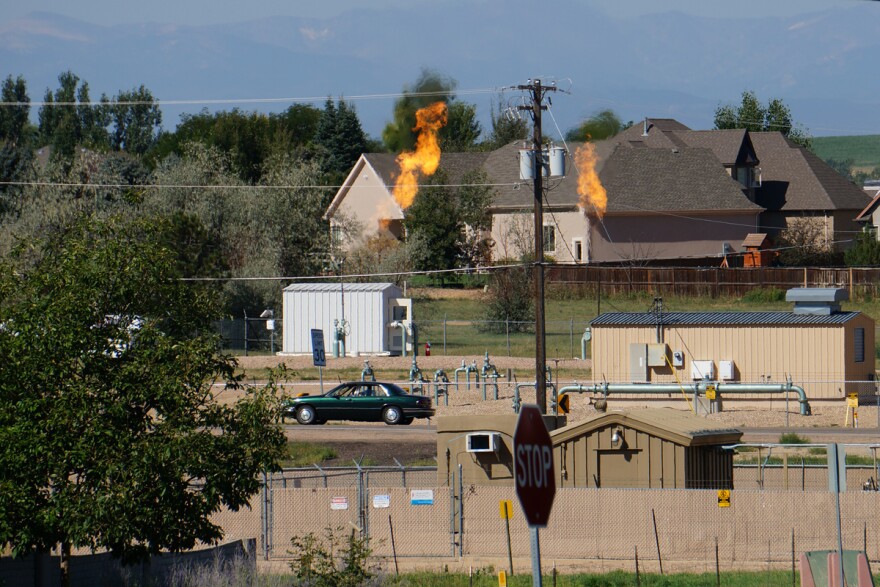Most oil and gas activity is associated with open fields and rural Colorado. Residential neighborhoods along the Front Range though are becoming a site for development.
As the booming oil and gas industry and cities fueled by that boom both expand quickly, they were bound to meet. It’s that headlong collision that’s brought strife.
A new Colorado rule [.pdf] now requires operators to contact building owners within a 1,000 foot radius before a well is drilled. It also requires operators to meet with anyone who owns a building within 1,000 foot radius of the proposed well if they request it.
“If the building unit owners request, they will discuss issues concerning security, noise, light, odors, dust, traffic and associated mitigation measures,” said Ginny Brannon, assistant director for Water and Energy at the Colorado Department of Natural Resources.
In short, the rule is focused at addressing concerns about drilling and fracking before a well is drilled. It doesn’t expand the notification radius when hydraulic fracturing occurs, or when refracturing happens. Some say Colorado notification laws need to go further to keep residents informed.
Meet Zee McCarroll
About 20 minutes north of Denver you’ll find the town of Firestone, firmly inside a resource rich geological formation known as the Denver-Julesburg (DJ) Basin.

Zee McCarroll has rented a yellow two-story home there for the past two years. When she moved in, across from her front porch was an open field with a well pad she thought was no longer in use.
But things changed in July.
“They brought in so much equipment. I mean there was like nine water trucks,” said McCarroll. “And then they brought in a bunch of other trucks that I have no idea what the names of them are.”
Eventually McCarroll called the company in charge of the site, EnCana Corporation. She learned about plans to refracture a well drilled in the late ’90s. The goal was to bring more gas to the surface.
An EnCana worker told McCarroll she should have received a voice mail — something she says she never got.
“I guess I’m accepting they’re here and there’s not really anything I can do about it. And that’s frustrating that you don’t have a voice,” said McCarroll.
A Web Of Laws And Notifications
Across the country, other suburban developments near Fort Worth and Pittsburgh are overlapping with oil and gas development. And there’s a patchwork of state laws when it comes to notifying residents about drilling and fracking activity. A number of states require companies to issue some form of notification when it seeks to drill a well.
In Colorado and many states, as far as fracking goes, there’s no requirement to notify nearby residents.
Wendy Wiedenbeck, EnCana’s community relations lead for the DJ Basin, says the goal should be to go beyond what’s required by Colorado law and ensure there aren’t any surprises for residents.
"Really we're talking about being good neighbors and talking about building on our track record of being good neighbors..."
“We need to continually learn and improve,” she said. “So when someone says ‘I wasn’t aware this was happening and I live right here,’ that’s disappointing.”
Wiedenbeck explains when a new well is proposed, it means contacting people far beyond the required notification area via voice mail, text message or going door to door. When working on an existing well, EnCana isn’t always legally required to notify nearby neighbors.
Wiedenbeck says her company strives to let them know anyway.
“We as an operator we need to embrace — and I think we have embraced quite frankly — that there is a level of outreach and notification that is absolutely required, regulations aside,” said Wiedenbeck.
In general, too much communication between neighbors and operators is better than too little, according to Simon Lomax, a research director with Energy in Depth, a project of the Independent Petroleum Association of America. While communication between companies and residents may look different across the country, Lomax says there should be common threads.

Operators should aspire to talk early and often to residents. Neighborhoods should know what to expect when a project starts.
“Really we’re talking about being good neighbors and talking about building on our track record of being good neighbors in different operating environments,” said Lomax
Lomax says rural America and developers have co-existed for decades.
When Industry Meets Suburbs
Suburban living presents unique challenges. Landscapes change quickly. The well near Zee McCarroll’s house was first drilled before her housing development even existed.
That’s why Kate Sinding with the Natural Resources Defense Council says residents should ideally be notified before wells are drilled, before they’re fracked, and before they’re refracked.
“There’s an ongoing question mark about the extent to which impacts to ground water or associated with air pollution might be different in different phases of development of a well bore,” she said. “Landowners may want to do baseline water testing or baseline air testing before and after a particular phase of activity so that if they have a case of alleged contamination they can pinpoint when that happened.”
Back near Zee McCarroll’s house, the project across from her front porch is mostly complete now. The white tower is now gone. Lately a large colony of prairie dogs spends time there barking in the sun. McCarroll says she can sometimes hear an exhaust fan and sees workers visiting the site.
"I think the more that people or companies hold back, I think the more non-trusting citizens become."
“I think the more that people or companies hold back, I think the more non-trusting citizens become,” she said.
McCarroll still has questions about the project and says she isn’t happy with it. In addition to Colorado, Pennsylvania and Illinois recently added new provisions to prompt more communication between developers and residents.
With fracking becoming more widespread, other states are expected to require it in the coming years.







